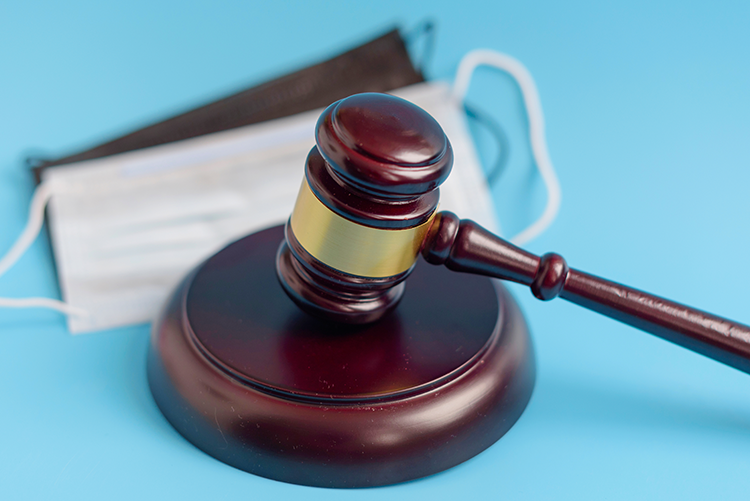Legal battles over coronavirus restrictions aren’t as novel as the virus—just look back 100 years

Image from Shutterstock.
During the past year, the COVID-19 pandemic has sparked numerous court challenges to government restrictions on public gatherings.
Earlier this month, for example, the Supreme Judicial Court of Massachusetts ruled that a Zoom hearing did not violate a defendant’s constitutional right to a public hearing.
In Vazquez Diaz v. Commonwealth, the court determined that the need to limit in-person gatherings during the pandemic justified the change in procedure for a motion to suppress evidence. “In the case of a virtual hearing,” the justices explained, “only the forum has been adjusted, not the prospective audience.”
In at least one way, the coronavirus isn’t so novel. Just as public officials at every level have taken steps to control the contagion, it was much the same a hundred years ago during the Spanish flu. And, like now, some individuals, believing that their rights were violated by such measures, turned to courts for help.
Take Frank Colletti, who was found guilty of murder in Akron, Ohio, and sought to have his conviction reversed. Among Colletti’s arguments was that his trial, held during the Spanish flu epidemic, had been impermissibly closed to the general public.
But, like the Bay State top court’s decision in the case of John Vazquez Diaz, a state appeals court in Colletti v. Ohio (1919) concluded that the courtroom door could be shut under the circumstances.
“No authority has been cited to us,” the judges observed, “raising the question of the right of the court to exclude the general public from the court room in case of an epidemic such as existed at or about the time of this trial.” The trial judge, “acting for the general public welfare exercised his privilege, and … it was his duty for the promotion of public health and welfare to proceed with the trial as he did.”
In Dula v. Board of Graded School Trustees (1919), the Supreme Court of North Carolina addressed a challenge to a school district’s decision to keep a school closed, even after the presence of Spanish flu had significantly abated. The board had concluded that, given the limited period remaining in the school term, it was a waste of time and money to open. North Carolina’s highest court upheld the board’s decision, finding that it had used its “best efforts to promote the public welfare” and the decision had not been “arbitrary.”
 Image from Shutterstock.
Image from Shutterstock.
Educating students was also before Arizona’s top court a century ago when it addressed a challenge to a local health board’s decision to close schools. It had been argued that over 80% of the children were free from Spanish flu, ready to attend school, and the schools were equipped with nurses.
But the Arizona Supreme Court ruled in Globe School District v. Board of Health (1919) that the schoolhouse doors could remain shut. In a lengthy opinion, the tribunal explained that “the order closing the public schools during the rage of the said epidemic of Spanish influenza, for the purpose of preventing the spread of such epidemic, was a valid measure, adopted within the power of the local city board.”
Two weeks later, the court ruled on a petition for habeas corpus filed by the owner of a “moving picture show” business who had been jailed for keeping his business open in violation of regulations designed to prevent the spread of the influenza.
The court, citing its rationale in Globe School District, didn’t break a sweat to turn away the prisoner’s request for his freedom.
In Paterson, New Jersey, Walter Clayton was convicted of violating a city ordinance after people “congregated” in his saloon while the Spanish flu was widespread in the city. The state’s highest court conceded in Board of Health v. Clayton (1919) that an epidemic of an infectious disease may be severe enough “to justify the most drastic rules against personal contact of individuals.”
However, the court ruled that the regulation was not tailored to meet the emergency. After concluding that “congregate” means as few as three people, the jurists noted that it would sweep up anyone who had three friends come to their home and play cards or have close relatives of a young couple attend their wedding.
Also during the Spanish flu, a lawyer in Spokane, Washington, was taken to task after failing to timely file a document in a case. The trial judge had been unforgiving, denying an extension. But the Supreme Court of Washington, in Howell v. Dunning (1919), gave the litigator a pass.:“We think it is evident that the appellant’s counsel had a good excuse for not filing the statement of facts within the 30 days, as he was in quarantine and not permitted to leave his house.”
The coronavirus is without precedent in many ways—but not all.

Randy Maniloff is an attorney at White and Williams in Philadelphia and an adjunct professor at the Temple University Beasley School of Law. He runs the website CoverageOpinions.info.



